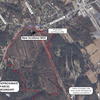New Scotland tables proposed property-maintenance law
— From Zoom
After initially planning to hold an in-person meeting this month, the New Scotland Town Board went virtual for its Aug. 10 public hearing on three proposed local laws. The most contentious was a proposed property maintenance law that would have allowed the town to send in a contractor to cut a property owner’s grass over 10 inches. The proposed law was tabled.
NEW SCOTLAND — With pushback cutting across party lines, the New Scotland Town Board has decided to re-examine a bill that would have extended the town’s regulatory authority over property owners’ grass and garbage.
After hearing over a dozen people speak on Aug. 10, the board decided to table a vote on Proposed Local Law C of 2022, which sought to “provide for the proper maintenance of residential, commercial, and industrial properties” in town “to prevent blight, unhealthy, hazardous, or unsightly conditions due to the accumulation of brush, grass, weeds, garbage or rubbish in order to protect the public, health, safety and general welfare of the residents ….”
The board did pass two other less-contentious laws that did not receive any public comment: one on recording meetings and board member attendance at those meetings, and the other requiring residents to report hazards before suing the town for injuries.
During the virtual hearing, town attorney Michael Naughton explained the idea behind the proposed property-maintenance law, which was that, over the years, the town has had a few incidents where properties had become abandoned. And neighbors have been stuck living next to a home that had become overgrown, he said, adding that “sometimes there’s garbage, and it’s tough to live next to.”
It’s difficult for someone who’s living next door to one of these blighted properties to sell their homes, Naughton said.
“And the idea would be that this would be more complaint driven,” he said.
A complaint would be made to the town’s building department, Naughton said, which would have the authority to do something about the lodged grievance.
But, before any action were to be taken, Naughton said, the property owner would have the opportunity to fix the problem. And then, if nothing was done, the town would have the authority hire a landscape contractor to take care of the maintenance issues.
To recoup its costs, the new law would allow the town to place a lien on the property, he said.
One recent issue the town faced with overgrowth was on Parkway Drive.
As Naughton was speaking, a picture of the Parkway Drive home, located off of New Scotland Road in Slingerlands, near the Bethlehem town line was projected on the screen.
He said a lot of neighbors complained about the property.
“And unfortunately, because the town didn’t have a law that could be used to go and take care of this problem,” Naughton said, “the neighbors had to put up with this for many years, and saplings that were growing up to the grass had become trees.”
He said more recently sewer alarms had gone off because the basement was filling up, and the town had to go in on an emergency basis.
What ended up happening was the neighbors took it upon themselves to clean up the property, whose owner was confined to a home, Naughton said.
“But that’s not really a great situation to have, the neighbors going in and doing that on private property,” Naughton said. “And so this is the kind of thing that the law is aimed at.”
Naughton said the model laws on which he based New Scotland’s bill had “become a little old-fashioned,” where “they’re thinking about people maintaining perfect lawns.”
The law he wrote realizes there are areas of town where residents have “an acre or two, it’s their front yard. And it’s all natural, it’s a natural field. Maybe it gets cut once a year,” Naughton said, “And so this law allows for that.”
Public comment
Democratic Albany County Legislator Vicki Plotsky, speaking only as a town resident, said, “This is the type of law that wants to be well tailored.”
Plotsky said she appreciated that the town needs a mechanism for enforcing some sort of standard, but she also appreciated living in a rural area and not having to conform to the suburban ideal of a perfect lawn.
“Part of me feels like we moved out of Delmar for a reason,” she said.
Plotsky said she’d like to have “the freedom, if you will, to basically have our property as we wish to maintain it.”
Plotsky also took issue with the fines.
“I feel the fines are quite on the high side,” she said
She said $250 for a first offense was “kind of pricey,” and asked the board to consider $50 or $100 instead.
Peter Drao, who ran last November for town board on the GOP ticket, was also opposed to the proposed local law.
Drao felt the “ordinance would impose homeowner association-like standards on any place in town that’s not zoned farm, rural, or natural open space.” He believed the proposed local law goes beyond the intent of the state state building code, and “would constitute an intrusion on the private property rights of town residents.”
Drao, who worked in the State Senate for two decades, then took issue with some of the specifics of the bill.
For example, the bill would have limited the size of backyard composting sites to four cubic yards, and Drao wanted to know why. “I didn’t see that referenced anywhere in the New York State Building Code,” he said
In his reading, Drao said wood piles fall under the same definition as compost sites. “So I guess that’s the threshold issue, large enough for anyone that exclusively burns wood, the storing of wood to heat their homes during the winter.”
He then asked the board to pare down the law to apply to vacant properties on the condition the parcel does not pose an immediate and significant threat or health hazard.
Resident Marsha Carlson asked the board to table the law “and undertake further study of issues around ecological and sustainable landscaping practices.”
Carlson said, “Taking time to look deeper into the problem and find solutions will bring increased resiliency in the face of temperature extremes and water shortages, deliver maintenance cost savings for residents and the town highway department, and promote a generally healthier environment for people, plants and animals.”
She said, “The attempt by the board to bring the Town of New Scotland Building Code into closer compliance with the New York State Property Maintenance Code is a worthy effort; however, in this case, it is particularly problematic because the state property management code is woefully out of date.”
Carlson then requested that the town recommend to the state that its property maintenance code be updated to reflect sustainable landscape practices.
Dianne Luci lives on Apple Blossom Lane in a densely-populated neighborhood just outside the village of Voorheesville where “most of the properties are very well maintained,” she said, adding, “But there’s a couple of properties that have been very neglected.”
Luci said neighbors on Apple Blossom Lane lived very close to one another, which she thought differentiated her from other speakers on Aug. 10, so “when you live in a small development like we do … property is devalued if you have people who don’t cut a shrub or let weeds grow up in your driveway.”
She continued, “So I think that the law would be nice.”
But she did agree there needed to be some changes made to the bill.
After Luci spoke, Supervisor Douglas LaGrange said most of the time the town has dealt with the issue, it’s been in densely populated neighborhoods.
Local Law C of 2022
The proposed local law stated it “shall be unlawful” for a residential, commercial, or industrial property owner to:
— Permit or maintain weeds, grass, or other vegetation to a grow to a height of over 10 inches for over 45 days;
— Permit the accumulation of dead weeds, grass, or brush for over 45 days; and
— “Permit, maintain, deposit, or scatter rubbish or garbage over any premises.”
The bill had a carve-out for agricultural operations and farmland as well as “drainage areas or natural open space areas” when it comes to limiting the height of weeds, grass, and other vegetation.
There was also a provision to allow for “No Mow May,” which “is a policy to discourage grass cutting during the month of May for the benefit of pollinators and other wildlife,” according to the bill.
Proposed Local Law C of 2022 also stated garbage could be placed outside of a building only if it’s placed in a “covered metal, wooden, or molded plastic receptacle.”
The bill further stated it “shall be the duty” of residential, commercial, or industrial property owners to:
— Maintain their properties “in a clean and sanitary condition and not permit the accumulation of rubbish or garbage”;
— Cut and remove “all such weeds, grass or other rank, poisonous or harmful vegetation as often as may be necessary to comply with the provisions of this law”; and
— Remove any trash accumulation “that has remained on the property for more than 30 days.”
Ultimately, garbage violations would have received a fine of $250 for the first offense and “$500 for the second or subsequent offense for a term not exceeding 15 days.”


